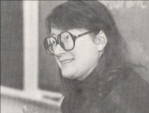
|
Joss Whedon Equality Now Tribute Address delivered 15 May 2006, Men on the Front Lines Honoree
[AUTHENTICITY CERTIFIED: Text version below transcribed directly from audio]
Itís nice when children credit their mothers for their success. And, I've heard a lot about Lee, whose radical ideas about womenís strength and independence and passion and empathy inspired Joss to create not only Buffy the Vampire Slayer but many other strong women characters in Firefly, in Serenity and his other work. Lee Sterns also inspired the creation of this organization, Equality Now, which was co-founded by Jessica Neuwirth, one of her -- one of Leeís, favorite high school students. She would have been very proud of you, Jessica and Joss, for all youíve done and continue to do, and, her spirit is here with us tonight. Joss also has an extremely energetic and ubiquitous fan base thatís organized fundraisers across the country for Equality Now, his super heroís favorite charity. So itís my great, great pleasure to introduce our special honoree, Joss Whedon, the wonderful man who's about to bring us Wonder Woman. We commend him for his outstanding contribution to equality in film and television. Ladies and Gentlemen, Mr. Joss Whedon.
I -- I'm surrounded tonight by people of extraordinary courage, and I know a thing or two about courage myself because I read a book with some courage in it one time. And it sounds really like a lot of work so Iíll just keep writing. I write. The most courageous thing I've ever done is something called a press junket, which is actually pretty courageous, believe me, because they ask you the same questions over and over and over and over and over and over. I've done as many as 48 in a day, these interviews, and they really -- they donít come up with the fresh stuff. So, there is one question that I've been asked almost every time Iíve been interviewed. So I thought tonight, briefly, I would share with you one question and a few of my responses. Because, when you're asked something 500 times, you really start to think about the answer. So now, I will become a reporter. Itís going to be amazing, the transformation. So, Joss, I, a reporter, would like to know, why do you always write these strong women characters? I think itís because of my mother. She really was an extraordinary, inspirational, tough, cool, sexy, funny woman and thatís the kind of woman I've always surrounded myself with. Itís my friends, particularly my wife, who is not only smarter and stronger than I am but, occasionally taller too. But, only sometimes, taller. And, I think it -- it all goes back to my mother. So, why do you write these strong women characters? Because of my father. My father and my stepfather had a lot to do with it, because they prized whit and resolve in the women they were with above all things. And they were among the rare men who understood that recognizing somebody elseís power does not diminish your own. When I created Buffy, I wanted to create a female icon, but I also wanted to be very careful to surround her with men who not only had no problem with the idea of a female leader, but, were in fact, engaged and even attracted to the idea. That came from my father and stepfather -- the men who created this man, who created those men, if you can follow that. So, why do you create these strong, how you say, the women -- Iím in Europe now, so, itís very, itís international -- these -- I donít know where though -- these strong women characters? Well, because these stories give people strength, and I've heard it from a number of people, and I've felt it myself, and its not just women, its men, and I think there is something particular about a female protagonist that allows a man to identify with her that opens up something, that he might -- an aspect of himself -- that he might be unable to express -- hopes and desires -- he might be uncomfortable expressing through a male identification figure. So it really crosses across both and I think it helps people, you know, in -- in that way. So, why do you create these strong women characters? 'Cause theyíre hot. But, these strong women charactersÖ Why are you even asking me this?! This is like interview number 50 in a row. How is it possible that this is even a question? Honestly, seriously, why are you -- why did you write that down? Why do you -- Why arenít you asking a hundred other guys why they donít write strong women characters? I believe that what I am doing should not be remarked upon, let alone honored and there are other people doing it. But, seriously, this question is ridiculous and you just gotta stop. So, why do you write these strong women characters? Because equality is not a concept. Itís not something we should be striving for. Itís a necessity. Equality is like gravity, we need it to stand on this earth as men and women, and the misogyny that is in every culture is not a true part of the human condition. It is life out of balance and that imbalance is sucking something out of the soul of every man and women whoís confronted with it. We need equality, kinda now. So, why do you write these strong female characters? Because youíre still asking me that question. Thank you very much for including me tonight. Thank you all.
Note: Address given on the occasion of Equality Now's honoring Joss Whedon for outstanding contribution to gender equality in film and television. Page Updated: 5/15/22 U.S. Copyright Status: Text, Audio and Images = Uncertain. |
|
|
© Copyright 2001-Present. |
 Meryl Streep:
Meryl Streep:

 Joss Whedon:
Joss Whedon:
